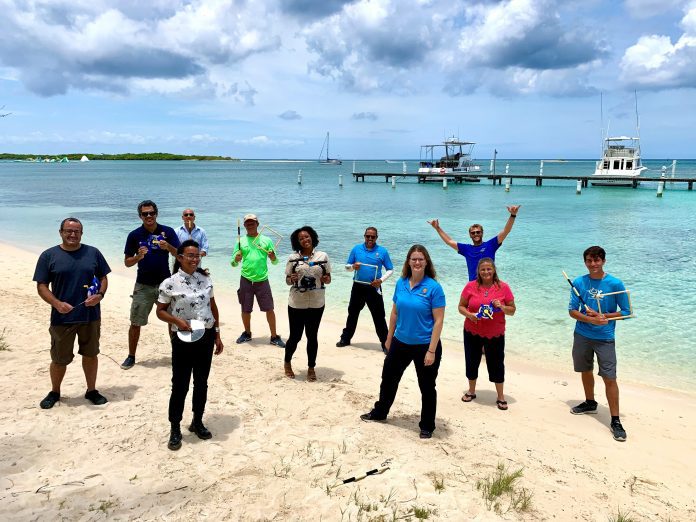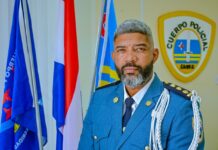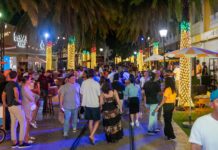Fundacion Parke Nacional Aruba (FPNA) ta orguyoso pa organisa e prome curso pa monitor rif di coral e siman aki, hunto cu facilitadornan – biologonan marino Tadzio Bervoets di Dutch Caribbean Nature Alliance (DCNA) y Roxanne-Liana Francisca di STINAPA Boneiro. Cursistanan cu ta participa ta representantenan di FPNA, JADS, ScubbleBubbles, Caribbean Lionfish Alliance (CLA), Aquawindies y Directie Natuur & Milieu (DNM).
Durante e curso di cuatro dia e cursistanan – tur divers certifica – lo wordo entrena pa colecta data siguiendo standardnan y practica pa monitor rifnan di coral di Global Coral Reef Monitoring Network (GCRMN) y di Atlantic and Gulf Rapid Reef Assessment (AGRRA). Banda di wordo entrena den e criteria pa monitor, tecnica y protocol, cursistanan lo wordo entrena tambe pa indentifica pisca, coral, invertebrato, alga, malesa di coral, y especienan invasivo – cu ta crucial pa monitor e bida di e rifnan di coral.
Rif di coral ta un ecosistema cu posibelmente tin e biodiversidad mas halto compara cu cualkier otro ecosistema na mundo. Banda di ta increibelmente bunita, varia, y ta anfitrion di un variedad asombroso di bida marino, rif di coral ta esencial pa e economia di Aruba. Rif di coral ta proteha nos costa di mal tempo y ta un zona di cria y hogar pa diferente especie di importancia vital pa pesca. Rif di coral y su piscanan unico ta provedor di Aruba su playanan bunita di santo blanco cu turista di tur parti di mundo ta bin disfruta. Sinembargo, rif di coral y su habitantenan ta wordo menasa pa desaroyonan na costa, recreacion marino y na costa, actividanan maritimo, y polucion di tera, aire y lama, y otro impactonan.
FPNA su Marine Park Manager interino Sietske van der Wal ta entusiasma pa porfin por cuminsa colecta data na un manera mas structural. “FPNA ta maneha cuatro Area Marino Protehi cu colectivamente ta wordo yama Parke Marino Aruba. Nos ta e unico pais den Reino cu no ta structuralmente monitor e bida di e rifnan di coral ainda y cu e curso aki nos ta haya e habilidad pa haci esaki nos mes.”
Despues di e curso aki, FPNA – hunto cu e aliadonan – lo inspecciona e rifnan di coral cada dos aña na ubicacionan representativo y asina por determina e estado di Aruba su rifnan, compara data despues di tempo y adapta maneho respectivamente. Data lo wordo comparti cu entre otro DCNA y GCRMN pa por sigui tendencianan na nivel nacional, den Reino y regional. E data colecta durante e inspeccionan lo wordo incorpora den e maneho di Parke Marino Aruba.
FPNA ta aprecia y ta agradecido na tur e facilitadornan y participantenan pa nan sosten pa hasi e curso aki posibel y uno exitoso – sea den forma financiero, di equipo y transporte, of dor di dedica tempo y esfuerso.
*ENGLISH*
05 MAY 2021
PRESS RELEASE
For immediate release.
FPNA hosts first coral reef monitoring workshop
ORANJESTAD, ARUBA – Fundacion Parke Nacional Aruba (FPNA) is proud to be hosting its first Coral Reef Monitoring Workshop this week, together with trainers – marine biologists Tadzio Bervoets from the Dutch Caribbean Nature Alliance (DCNA) and Roxanne-Liana Francisca from STINAPA Bonaire. Participants include representatives from FPNA, JADS, ScubbleBubbles, Caribbean Lionfish Alliance (CLA), Aquawindies and the Directorate of Nature and Environment (DNM).
During this four-day workshop, the participants – all certified divers – will be trained as data collectors following standard coral reef monitoring practices as described by the Global Coral Reef Monitoring Network (GCRMN) and the Atlantic and Gulf Rapid Reef Assessment (AGRRA). Besides being trained in monitoring criteria, techniques and protocol, participants will also be trained in fish, invertebrate, coral recruits (baby coral), algae, coral disease, and invasive species identification – which are a crucial part of monitoring the health of coral reefs.
Coral reefs are ecosystems with possibly the highest biodiversity and unlike anything else on the planet. Apart from being incredibly varied and beautiful, and hosting an array of amazingly interesting life forms, coral reefs are essential to the economy of Aruba. Coral reefs protect our coasts from storms and are a nursery and home to numerous species that are vital to our fisheries. Coral reefs and their specialized fish also provide for Aruba’s beautiful white sandy beaches that tourists worldwide come to enjoy. However, coral reefs and their inhabitants are increasingly being threatened by coastal development, marine and coastal recreation, maritime activities, extractive activities, and land, air and marine pollution, and other impacts.
FPNA’s interim Marine Park Manager Sietske van der Wal is excited to finally start with data collection. “FPNA manages four Marine Protected Areas (MPAs) that are collectively known as Parke Marino Aruba. We are the only island within the Kingdom not yet structurally monitoring the health of our coral reefs and with this workshop we will now acquire the skills to do so ourselves.”
After this workshop, FPNA – together with its partners – will be conducting coral reef surveys every two years at representative locations in order to assess the state of Aruba’s reefs, compare data over time and adapt management accordingly. Data will be shared with DCNA, GCRMN and others to be able to follow trends at a national, Kingdom and regional level. The data acquired through these surveys will also be incorporated into the management of Parke Marino Aruba.
FPNA appreciates and thanks all facilitators and participants for their support in making this workshop possible and a success – be it financially, by supplying equipment and transport, or by devoting their time and effort.
*NEDERLANDS*
05 MEI 2021
PERSBERICHT
Voor onmiddellijke publicatie.
FPNA organiseert eerste workshop om koraalriffen te monitoren
ORANJESTAD, ARUBA – Fundacion Parke Nacional Aruba (FPNA) organiseert deze week met trots haar eerste Coral Reef Monitoring Workshop, samen met trainers – marien biologen Tadzio Bervoets van de Dutch Caribbean Nature Alliance (DCNA) en Roxanne-Liana Francisca van STINAPA Bonaire. De deelnemers bestaan uit vertegenwoordigers van FPNA, JADS, ScubbleBubbles, Caribbean Lionfish Alliance (CLA), Aquawindies en Directie Natuur en Milieu (DNM).
Tijdens deze vierdaagse workshop worden de deelnemers – allemaal gecertificeerde duikers – opgeleid tot dataverzamelaars volgens standaarden zoals beschreven door het Global Coral Reef Monitoring Network (GCRMN) en de Atlantic and Gulf Rapid Reef Assessment (AGRRA). Naast een training in monitoringcriteria, -technieken en -protocol, worden deelnemers ook getraind in het identificeren van vissen, ongewervelden, koraal kiemen (baby koraal), algen, koraalziekten en invasieve soorten die essentieel zijn voor het monitoren van de gezondheid van koraalriffen.
Het koraalrif is een ecosysteem met mogelijk de hoogste biodiversiteit van alle ecosystemen op aarde. Afgezien van het feit dat koraalriffen ongelooflijk gevarieerd en mooi zijn, en een scala aan bijzondere en interessante levensvormen herbergt, zijn koraalriffen essentieel voor de economie van Aruba. Koraalriffen beschermen onze kusten tegen stormen en zijn een standplaats en broedplaats voor tal van soorten die van belang zijn voor de visserij. Koraalriffen en de gespecialiseerde vissen die er leven zorgen ook voor de prachtige witte zandstranden van Aruba waar toeristen vanuit de hele wereld van komen genieten. Koraalriffen en hun bewoners worden echter in toenemende mate bedreigd door onder andere kustontwikkeling, mariene- en kustrecreatie, maritieme activiteiten zoals ontginning, en lucht-, land- en zeevervuiling.
De interim Marine Park Manager van FPNA, Sietske van der Wal, is verheugd om eindelijk te kunnen beginnen met het verzamelen van data. “FPNA beheert vier Marine Protected Areas (MPA’s) die gezamenlijk bekend staan als Parke Marino Aruba. We zijn het enige eiland in het Koninkrijk dat de gezondheid van onze koraalriffen nog niet structureel monitort en met deze workshop verwerven we de vaardigheden om dit voortaan zelf te kunnen doen.”
Na de workshop zal FPNA – samen met haar partners – om de twee jaar de koraalriffen op representatieve locaties monitoren om zo de gezondheid van de Arubaanse koraalriffen te beoordelen, ontwikkelingen in de loop van de tijd te kunnen vergelijken en het beheer daarop aan te passen. De resultaten zullen worden gedeeld met onder andere DCNA en GCRMN om zo de staat van koraalriffen op nationaal, Koninkrijks- en regionaal niveau te kunnen volgen. De verzamelde gegevens zullen ook worden aangewend voor het beheer van Parke Marino Aruba.
FPNA waardeert en bedankt alle facilitators en deelnemers voor hun steun bij het mogelijk maken van deze workshop – of het nu financieel is, door het leveren van apparatuur en transport, of door hun tijd en inzet.






